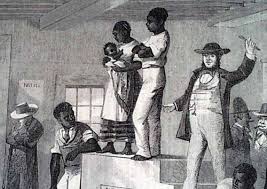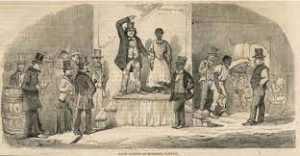Although I have not conducted a “scientific study” that elitist academicians would consider worthy of being published in some high-brow Academic Journal that approximately six people, and that is being generous, will ever read. I know through face-to-face interaction that many, not all, of the African-American males sitting in my classes, have purposely muted their intellectual gifts due to a desire to fit in with their peers. Unfortunately for my students, acceptance into that world hinges on a most-unfortunate construct of “blackness.”
The most obvious sign of this on-going process is that the public face
of my students conflicts with the one that they show within what can be termed
the safe confines of my office.
To my chagrin, it is common to hear critics place the voluminous
centuries-long problems affecting Black America at the feet of Black men. The
most familiar form that the alluded to criticism arrives is the charge that
contemporary Black males do not understand what it means to be a Black man in America. This tired
refrain is a clumsy assertion that avoids impactful matters such as
discrimination, racial bigotry, and institutional racism. According to critics,
it is the shortcomings of Black males, not structural problems that are the
root cause of Black male misery.
From my post as an African-American Studies Professor, I have mentored
hundreds, if not thousands, of African-American males. This frontline
experience has taught me that the vast majority of my students carry an
unnecessary burden that erodes essential portions of their being that will be
needed to confront a hostile unsympathetic White world. Richard Majors
characterized the referenced burden as “the cool”.
According to Majors, the most pernicious portions of “the cool” are
found in its ability to cause Black males to secretly lock away their intellectual
curiosity in a dark place where no one, including themselves, will ever find
it. Despite what critics may choose to believe, anyone who has raised or
interacted with Black boys can attest to the fact that they enter this world
overflowing with curiosity. Evidence suggests that in time, these natural
inclinations are muted by external factors. By the time Black males reach my
classroom, they have done everything in their power to avoid being labeled a
“nerd”; a descriptor that is diametrically opposed to Majors’ “cool”.
Now I do understand that much of what is shared with me flows from the
fact that many Black males consider my office a “safe space” where they can expound
on hidden interests and goals. The repetition of this situation convinces me
that many of my Black male students’ are afraid to display their intellectual
curiosities in public spaces. They are apparently paralyzed by a fear that a
coalition of friends, strangers, and family members would persecute them for
harboring such interests.
I view these young men as kinsmen as I also harbored intellectual
curiosities that I am certain caused my “outsiders” status among my peers.
Fortunately, I was oblivious to such matters as I was too busy pursuing my
intellectual interests.
Somewhere along this path called life, I learned that it was crucial
that I developed “knowledge of self”; meaning, an examination of what has
occurred to me. Experience has taught me that the process of knowing thyself is
an arduous one that forced me to closely examine success, failures, likes,
dislikes, trials, and tribulations. This particularly difficult process led me
to view my environs and those that populated them in a less than favorable
light.
The pain associated with my examination of life pivoted along a dangerous rail that led me to an examination of from whence my feelings of inadequacy emanated. I know that I am not alone in such matters. If you are a Black man born and raised in a nation that enslaved your ancestors and maligned you merely due to your physical appearance, rest assured that something and I mean something significant, happened to you. Your failure to examine and address what occurred is akin to a death sentence.
I’ve learned that a breakthrough that allows you to escape from the
hangman’s noose can occur at any moment. For many Black men, the stay of
execution never arrives.
My stay of execution arrived while reading the writings of noted
intellectual James Baldwin. It was Baldwin’s generosity to
allow me to view his rocky relationship with his father that illuminated
crucial portions of my relationship with my father, grandfather, uncles,
cousins, and associates. In the referenced commentary, Baldwin penned the
following.
I am not so much
my father’s son as he was his father’s son.
I have yet to find a more poignant line that illuminates the unspoken
uneasiness and angst that I developed regarding Black men.
In time, I understood that many of my issues with the Black men
surrounding me were due to the fact that we viewed the same world through
vastly different lenses. I am a portion of the first non-Southern generation in
my family. Therefore, my interests were formed by an urban setting, while my
father and grandfather (the foremost influences on my understanding of manhood)
hailed from an undeveloped, rural Stone Mountain, Georgia. I am certain
that their love for fishing and hunting was partially born from necessity; I
never developed the love. My compulsions flowed from likes, not needs forced on
be due to survival purposes. I learned that for the sake of camaraderie the
need to suppress my interests and engage in fishing.
I, like many of my students, learned that my likes and dislikes were a
double-edged sword that simultaneously provided enjoyment and a distancing from
those that I desperately desired approval from.
This situation was exacerbated by the fact that my peers’ favorite pastime of socializing was a true allergen for me. While others busied themselves socializing, I spent my time with a “who’s who” of Black intellectual thought.
Richard Wright became a friend.
Huey P. Newton a comrade.
W.E.B. Du Bois an advisor.
Alice Walker taught me what a man ought to be and ought to do via
Grange Copeland.
I relished the fact that books provided endless opportunities to avoid
social settings. Yet, my experience was markedly different from my students.
Unlike many of the male students that I advise, I never felt “peer
pressures” as I was too busy pursuing my intellectual interests to be bothered
with such triviality. The ability to pursue my interests without restraint is
one of the most reverberating gifts I received from my beloved mother. She
created a safe space for me to pursue my intellectual endeavors at every moment.
There is little room to argue against the notion that I was what others termed a
“nerd” and even less room to question if such a characterization affect me at
all.
I am not an overly optimistic person; however, I do recognize that
many of the young black men I speak to regarding this matter are suppressing
genius inside of them. In many ways, the suppression of genius that would undoubtedly
benefit themselves, their family, their community, their Race, their nation,
and the world is an unbelievably selfish act. I have found that so many of
these young men need permission to unveil their true identity.
Black America could help the activation of this latent genius by
seizing and reversing a daunting narrative that has denigrated Black people for
centuries. The lies regarding Black inferiority and inefficiency have been
repeated so often that even Blacks have joined others in denouncing their own. This
psychosis reminds one of the infamous “Black and White baby doll test” performed
by Kenneth and Mamie Clark that proved pivotal in the 1954 Brown v. Board of Education
(Topeka, Kansas) case.
The maligning of African-American males intellectual capacities and lack
of intellectual curiosity has created a public discourse that suffocates their
intellectual interests. Black America must busy itself altering this narrative.
Such is the only purposeful path capable of positioning African-American males on
a path to success.
It is time that an environment that encourages Black males to venture
beyond typical expectations such as sports and music emerges with the force of
a Hurricane. Although difficult for many to comprehend, the seizing of a tired
narrative that disenfranchises Black males is the most reliable path for them
to both discover their purpose while securing success against formidable odds. At
least that is what two decades of teaching has taught me.
And, I am willing to bet that I am not wrong.
Dr. James Thomas Jones III
Like this:
Like Loading...



